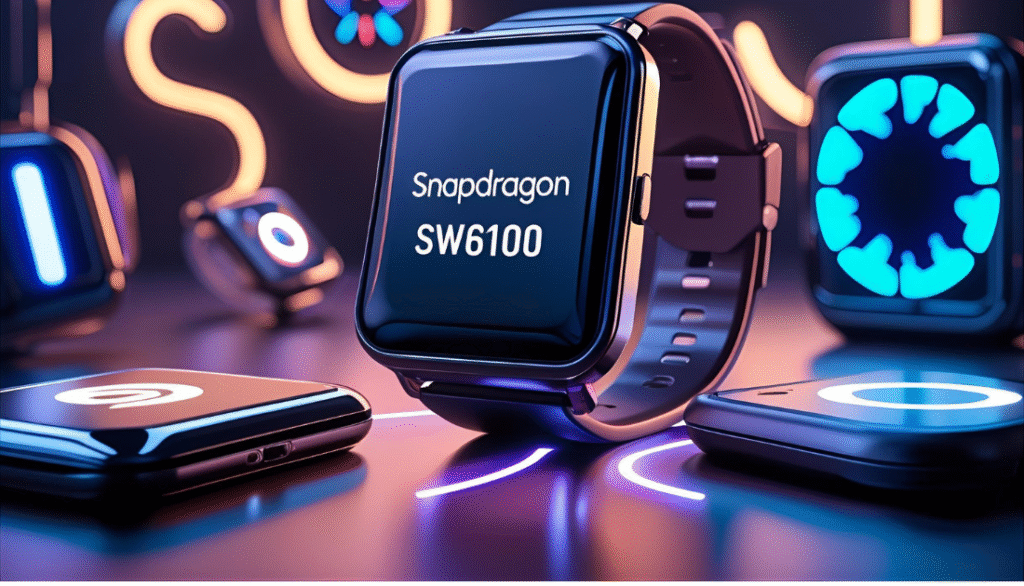Qualcomm is reportedly designing a new Snapdragon chipset, SW6100, from the ground up specifically for wearable devices—marking a major departure from its previous strategy of repurposing older smartphone chips for smartwatches.
Highlights
- Ground-Up Design: Snapdragon SW6100 (codenamed Aspen) is being built from scratch, marking a departure from reusing legacy smartphone SoCs for wearables.
- Modern Architecture: Expected configuration includes a high-performance Cortex-A78 core, a quad-core Cortex-A55 cluster, and LPDDR5X memory—optimized for both power and performance.
- Fabricated on Advanced Node: Potential 3nm TSMC fabrication (unconfirmed) could drastically improve power efficiency and thermal performance—ideal for all-day smartwatch usage.
- AI & Health Integration: SW6100 aligns with Qualcomm’s push toward AI-on-the-edge wearables, enabling health diagnostics, voice recognition, and context-aware apps.
- Big Leap From Cortex-A53 Era: New chip replaces aging Cortex-A53 cores, promising significant generational gains in speed and battery life, potentially rivaling Snapdragon W5 Gen 1’s 50% power efficiency boost.
- Wearable-Specific Innovation: Reflects Qualcomm’s shift toward “feature-focused” wearables—tailored for next-gen use cases like ambient AI, not just step tracking.
- Competitive Parity: Core setup mirrors Samsung’s Exynos W1000, indicating a converging industry consensus on optimal wearable chip design.
- RISC-V Uncertainty: Earlier Qualcomm-Google collaboration on RISC-V chips remains in limbo, with no commercial launch in sight.
Codenamed “Aspen,” the custom SoC is expected to power the next generation of Wear OS smartwatches, which are set to debut in 2026.
Purpose-Built for Wearables, Not Repurposed from Phones
Unlike earlier Qualcomm wearable chipsets that were often modified versions of aging mobile processors, SW6100 represents a clean-slate architecture tailored to the unique performance, efficiency, and size demands of wearable tech.
Qualcomm’s focus is now evolving beyond step tracking into areas like contextual health monitoring, ambient AI, and on-device voice recognition.
According to Android Authority, the SW6100 is expected to include:
- A single-core Arm Cortex-A78 for performance tasks
- A quad-core Arm Cortex-A55 for power efficiency
- An LPDDR5X RAM controller for faster memory access
- Potential integration with a QCC6100 co-processor (rumored but not confirmed)
- Fabrication on an advanced TSMC node (potentially 3nm, though specifics remain undisclosed)
These enhancements are expected to deliver better energy efficiency, improved thermal handling, and longer battery life compared to previous Snapdragon W-series chips based on Cortex-A53 architecture.
More Feature-Focused, AI-Ready Wearables
Qualcomm’s VP and GM of Wearables, Dino Bekis, has previously confirmed a strategic shift toward developing “more feature-focused” wearable platforms, with a strong emphasis on AI and PC-level functionality.
While the company had earlier announced a collaboration with Google to build a RISC-V-based wearable chip, recent reports suggest that partnership may not yield a commercial product in the near future.
SW6100, however, appears to be Qualcomm’s flagship response to the increasing demand for dedicated, power-efficient silicon capable of supporting advanced wearables in a competitive landscape.
Architecture Aligned With Industry Trends
The architecture of SW6100—featuring a 1× Cortex-A78 + 4× Cortex-A55 layout—mirrors Samsung’s Exynos W1000, indicating a growing industry consensus around this configuration as the optimal balance between performance and efficiency in wearable devices.
Analysts also speculate that a shift to a 3nm fabrication process (down from 4nm in the current Snapdragon W5 Gen 1) could further enhance battery life and performance.
India Expansion and Broader Platform Integration
Beyond wearables, Qualcomm is expanding its strategic footprint in India and adjacent markets:
- On July 21, it will host Snapdragon XR Day in New Delhi to showcase its AR/VR/MR platforms.
- On July 30, Snapdragon Auto Day will highlight in-vehicle tech innovations, including infotainment and ADAS platforms tailored for Indian conditions.


